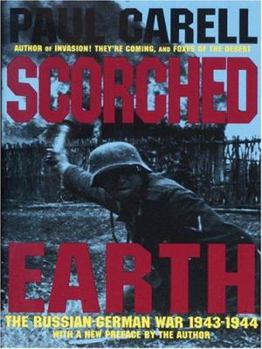Scorched Earth: The Russian-German War 1943-1944
(Book #2 in the Hitler's War on Russia Series)
Select Format
Select Condition 
Book Overview
The classic This new edition of Paul Carrell's eastern front study picks up where Hitler Moves East left off. Beginning with the battle of Kursk in July 1943, Carell traverses the vast expanse of the Russian War, from the siege of Leningrad and the fierce battles of the norther front, to the fourth battle of Kharkov, and the evacuation of the Crimea, a withdrawal forbidden by Hitler. The book ends in June of 1944 when the Soviet Armies reach the East...
Format:Hardcover
Language:English
ISBN:0887405983
ISBN13:9780887405983
Release Date:January 1997
Publisher:Schiffer Publishing
Length:600 Pages
Weight:2.65 lbs.
Dimensions:1.4" x 6.3" x 9.1"
Customer Reviews
4 ratings
Great Read
Published by Thriftbooks.com User , 16 years ago
Paul Carell takes military reading enjoyment to the next level while giving a macro to micro account of this brutal conflict. No other work so graphically details the trials and struggles of the ordinary soldier, and yet, still guides the reader through the bigger struggles at the strategic level. Critics attack his bias towards German military ability, but on the whole, no other work captures the feel of battle on the Eastern Front as well as his. Enjoy!
Struggles
Published by Thriftbooks.com User , 20 years ago
This book is essential to study the Russo-German conflict. Yes Paul Carrell is biased to the German side, understandable as a veteran of WW2, but he has put together a solid and most readable effort. He adds a personal face to the battle, a story not only told on the grand scale of battle, but also of the smaller things, like a soldier's long journey back to his own lines. The story is told slightly out of sequence, mainly to show what was the turning point of these two years(Kursk) and then tells the story from beginning to end. It is well worth the investment of time. The book has pictures of varying quality but the maps are excellent.
The Beginning of the End
Published by Thriftbooks.com User , 21 years ago
Once again, Mr. Carell has written a masterful compendium of the Eastern front in WW 2 covering 1943-44. A bit chronologically out of place, the battle of Kursk is covered first. Not surprisingly, the author feels that this battle was the true turning point in the war, not Stalingrad; and futhermore, that he believes that Germany could have won it with less meddling by Hitler and without the total intelligence compromise that occurred. A whole chapter deals with this security compromise at the highest level which to this day the source is not known. Because of this, the operation was doomed from the getgo, as the germans could hardly afford a huge battle of attrition and expect to win at this stage. Subsequent portions of the book deal with General Manstein's masterful retiring action that, though not able to break the seige of Stalingrad, was brilliant in his ability to hold open the Rostov corridor long enough for the large number of german forces in the caucasas to escape, some of them over a frozen Sea of Azov!Manstein's ability to contain the Russian offensive and prevent an encirclement of German forces that would have dwarfed Stalingrad with relatively meager forces may be the most overlooked tactical success of WW2 - as most retiring actions are. After this, the actions around Kharkov are covered in good detail, especially general Hausser's controversial retreat from certain destruction, disobeying Hitler's direct order to hold at all costs. Subsequent to this, Manstein's counteroffensive that encircled and destroyed these forces and retook Kharkov were Mansteins'last and perhaps greatest victory and germany's last successful offensive that finally stabilized the eastern front in 1943. The remainder of the book covers a myriad of retiring actions in late '43 - early '44 such as Demyansk, Velyka Luki, Cherkassy, that from a tactical perspective are fairly interesting, but are depressing for the hopelessness of the actions and Hitlers' obstinate demand to hold territory that the germans didn't possess the forces to protect. These mini-disasters presaged the meltdown of Army Group Central in June 1944. As is usual in Mr. Carell's books, many pictures and maps are included. This era of the conflict is certainly not the most popular for reading, but is well covered albeit from a progerman skew. The most exciting portions are General Mansteins' battles in early 1943. It is an indispensible book for devoted students of the Eastern front.
The best book about the struggle between Germany and Russia
Published by Thriftbooks.com User , 28 years ago
This 'Scorched Earth' traverses the vast expanse of the Russian War from the battle of Kursk -- including the greatest tank battle of Prokhorovka -- , the siege of Leningrad and the 4th battle of Kharkov, the Cannae of the German armies in the region of Armeegruppe Mitte (Army Group Center) and finally to the evacuation of the Crimea, a withdrawal forbidden by Hitler. It covers nearly all bloody fighting between Germany and Russia after the German defeat of Stalingrad. I suppose that anyone who is intersted in the Russo-German War should read this well-known and famous war history classic.





